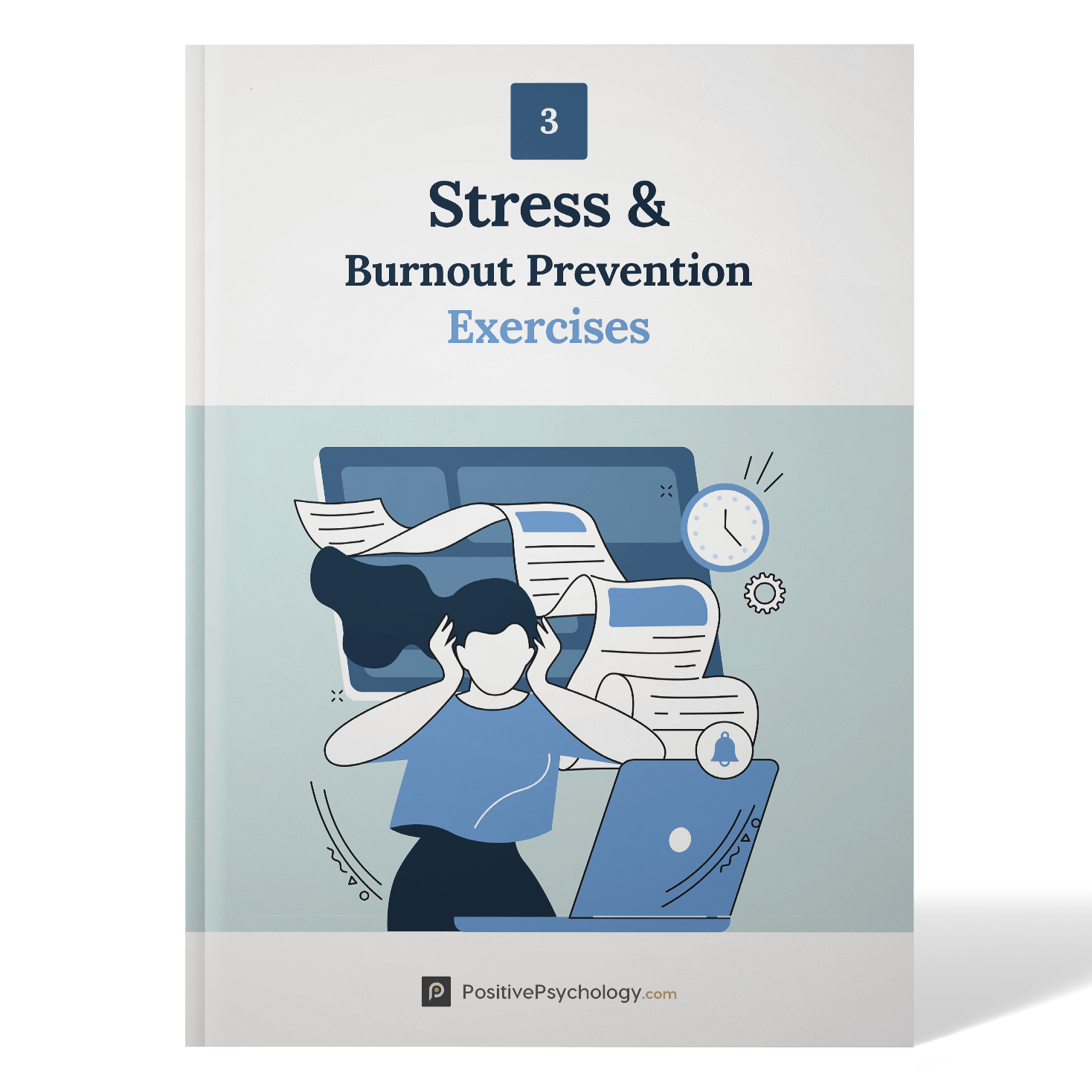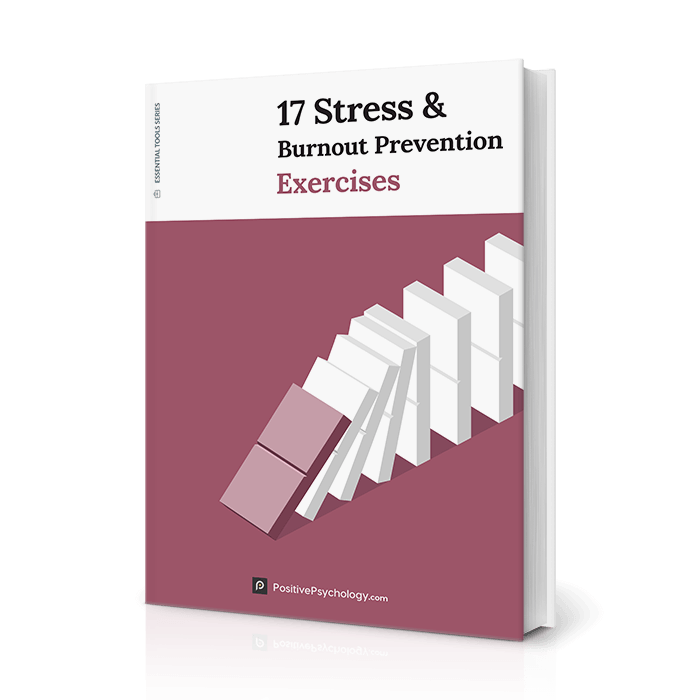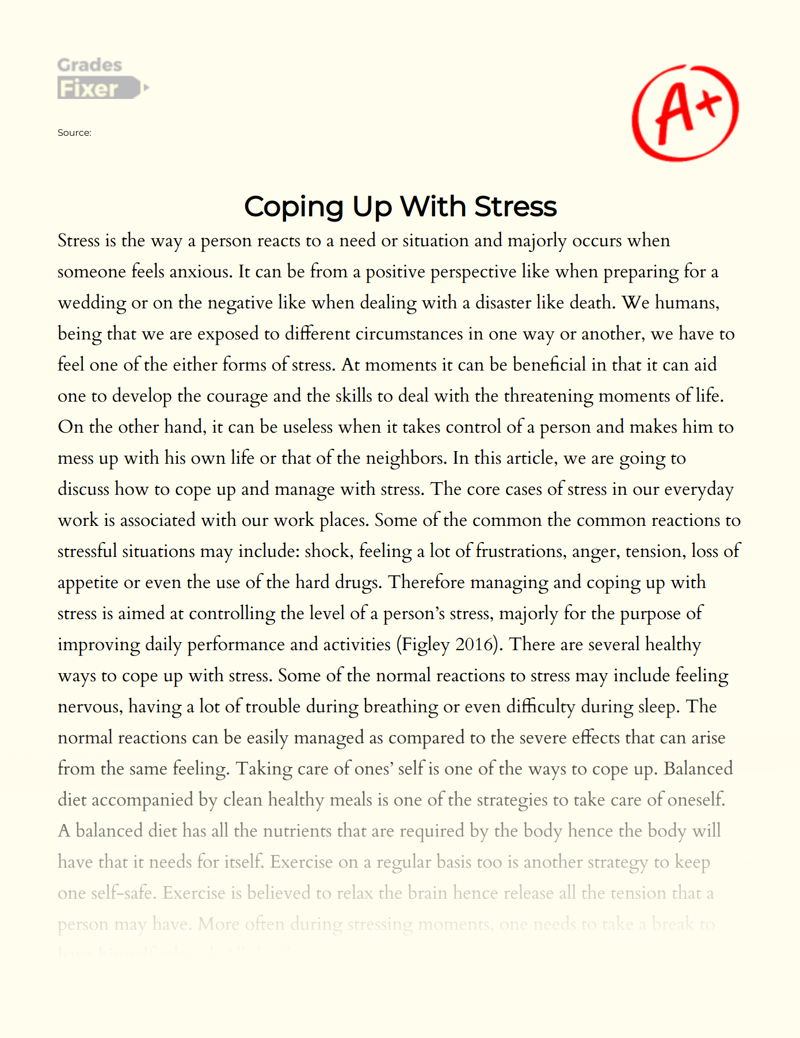How to Cope with Stress Essay
Introduction, how do stress and stressors help a person in identifying ways to cope, problem solving approach in coping stress, the identification of the stressor.
According to Aamodt (2009) stress is the psychological and physical reaction to certain life events or situations. Fear, resistance, resentment, change, relations with others, organizational politics, and unfavorable physical environment are the main causes of stress (Aamodt, 2009). Even though stress affects different personalities differently, it could result to grave consequences if not well managed.
Many people often think there is little that can be done about their level of stress. However, the fact is contrary. Individuals should identify their stressors and develop coping strategies aimed at neutralizing and finally eliminating the effects of the stressors. I have in the past adopted various strategies in coping with stress.
There are many stress coping methods. However, individuals often find themselves employing unhealthy and unproductive methods, which end compounding the problem. Such methods include withdrawal from friends and families, use of pills, drinking, smoking, overeating, and taking out of stress on other people. Even though these methods can work, their results are temporary as individuals soon face the reality of the stressor.
Healthier and effective ways of controlling stress require either situation change, or reaction change. Every individual exhibits unique response to stress, which makes it impossible to have a common method of coping. The simplest approaches to coping with stress, which I have used in the past, include problem identification and solving, acceptance, alteration, self-nurturing, and anticipatory approach also suggested by Aldwin (2007).
Problem solving approach is a strategy that its applicability is dependent on the determination of the main cause of stress. Once the stressor is identified, it becomes easy to solve the stress as an individual directs his or her energy towards subduing the stressor. For example, if lack of finances is the main cause of stress, then an individual may seek for new employment to provide for the much-needed cash.
The identification of the stressor also opens a window for an individual to explore other adaptation methods, which can be of help in the future such as avoidance. In anticipatory approach, an individual prepares for possible causes of stress and consequently prepares for them before their actual occurrence. Past trends and acquired knowledge can help an individual in such preparations.
For example, a student subjected to last minute revision pressures and stress for failing to revise in time may expect the same, hence prepare early in the following semesters to avoid going through the same. This method is very effective as an individual can review and continually revise the best method to use every time the stressor reoccurs. Sometimes stressful situations are not only complex, but also impossible to avoid.
It is only prudent for individuals affected to alter and adapt to such situations. This involves finding possible ways of changing an individual’s operation to avoid the stress from reoccurring. For example, stress caused by coworkers could be avoided by expressing ones’ feelings to the specific workers instead of bottling them up. If the desired change is not achieved, then one can go a step further by changing his or her own behaviors.
Stressors such as the death of people we love, fatal accidents, and illness are unavoidable and impossible to ignore. However, letting such stressors take tall of an individual’s life is also unacceptable. In such cases, the best coping strategy is acceptance. Though hard to take, acceptance is the only way out for individuals facing unchangeable life-threatening situations.
There are other effective coping strategies, which even though I have not used, I would consider applying. Self-nurturing is such “effective way of coping with stress” (Aldwin, 2007).
Creating time for fun and relaxing, enhance our ability to copy with life’s unending stressors. It is therefore prudent for an individual to engage frequently in healthy ways of relaxing such as, going for a walk, playing with a pet, going adventures, watching comedies, and lighting scented candles.
Aamodt, M. G. (2009). Industrial/Organizational Psychology: An Applied Approach (6th ed.). Belmont, CA: Cengage Learning.
Aldwin, C. M. (2007). Stress, coping, and development: an integrative perspective (2nd ed.). New York, NY: Guilford Press.
- Chicago (A-D)
- Chicago (N-B)
IvyPanda. (2023, October 30). How to Cope with Stress Essay. https://ivypanda.com/essays/coping-with-stress-essay/
"How to Cope with Stress Essay." IvyPanda , 30 Oct. 2023, ivypanda.com/essays/coping-with-stress-essay/.
IvyPanda . (2023) 'How to Cope with Stress Essay'. 30 October.
IvyPanda . 2023. "How to Cope with Stress Essay." October 30, 2023. https://ivypanda.com/essays/coping-with-stress-essay/.
1. IvyPanda . "How to Cope with Stress Essay." October 30, 2023. https://ivypanda.com/essays/coping-with-stress-essay/.
Bibliography
IvyPanda . "How to Cope with Stress Essay." October 30, 2023. https://ivypanda.com/essays/coping-with-stress-essay/.
- Anticipatory Logistics and the Corporate World
- Miami Beach as a Relaxing Place
- Relaxing Travel: Changes in the Airline Industry
- Relaxing Suds Incorporated: Massager Manufacturing
- Dementia: Relaxing Music at Mealtime in Nursing Homes Agitated Patients
- Addictions and Emotions in Biopsychology
- Health and Wellbeing Issues: Ali’s Scenario
- Self Efficacy, Stress & Coping, and Headspace Program
- Click, and Facebook revises privacy by Tim Dick
- Race and Ethnic Minorities in the U.S.
- The effects of trauma on patients and counselors
- Concept and Treatment of Alcohol Abuse
- Assessing Psychological Constructs With Multiple Methods, and Assessing Multiple Expressions
- Review of Stereotype Threat and Arousal: Effects on Women's Math Performance
- Video Games and Visual Attention

Psychology Discussion
Essay on stress: it’s meaning, effects and coping with stress.
ADVERTISEMENTS:
Essay on Stress: It’s Meaning, Effects and Coping with Stress!
Stress is a very common problem being faced today. Every individual will experience stress in one or the other time.
The term stress has many definitions, Lazarus and Folkman (1984) have defined stress as “an internal state which can be caused by physical demands of body or by environmental and social situations, which are evaluated as potentially harmful, uncontrollable, or exceeding our resources for coping”.
According to David Fontana “stress is a demand made upon the adaptive capacities of the mind and body”.
These definitions indicate that stress represents those conditions under which individuals have demand made upon them, that they cannot physically or psychologically meet, leading to breakdown at one or other of these levels.
Stress is usually thought of in negative terms. But ii can manifest itself in both positive and negative way. It is said to be positive when the situation offers an opportunity for one, to gain something.
Eustress (the Greek word ‘eu’ means good) is the term used to describe positive stress. It is often viewed as motivator, since in its absence the individual lacks the spirit necessary for peak performance. Distress is the term used to indicate negative stress.
Almost any change in the environment- even a pleasant change such as a joyful trip- demands some coping, and a little stress is useful in helping us to adapt. But beyond some point, stress becomes a ‘distress’.
What acts to produce distress varies from person to person, but some events seem to be stressors for every person.
Examples of stressors are:
1. Injury or infections of the body, dangers in environment, major changes or transitions in life which force us to cope in new ways.
2. Physical stressors like noise, pollutions, climatic changes, etc.
3. Hustles of everyday life centering on work, family, social activities, health and finances.
4. Frustrations and conflicts.
The physical, environmental and social causes of the stress state are termed stressors. Once induced by stressors the internal stress state can then lead to various responses. On the other hand, psychological responses such as anxiety, hopelessness, depression, irritability, and a general feeling of not being able to cope with the world, can result from the stress state.
Stress cycles:
Stress has a number of immediate effects. If the stressors are maintained, long-term behavioural, physiological, emotional and cognitive effects occur. If these effects hinder adaptation to the environment or create discomfort and distress, they themselves become stressors and, tend to perpetuate a ‘cycle’ of distress.
Example, a patient spends more money on treatment, may experience continued stress even after the cure of the disease, because repayment of debt cause stress for long time in him or a patient whose leg is amputated after accident may continue to worry about it.
On the other hand, many people have developed ways of coping with stressors, so that they are able to respond adaptively. This is the ‘wellness cycle’. Teaching people adaptive ways of handling stress, so as to promote the wellness cycle is an important part of the newly emerging field of behavioural medicine.
Effects of stress:
Stress is not always harmful. In fact, it is recognised that low levels of stress can even helps for better performance. For example, a student can prepare well for forthcoming examination only if he has some stress. However, excess level of stress is undoubtedly harmful.
The effects of stress are divided into three categories:
a. Physiological effects:
Commonly appearing stress related bodily disorders are-peptic ulcers, hypertension, chronic fatigue, hormonal changes, increased heart rate, difficulty in breathing, numbness of limbs, heart disease and reduction in immunity, etc.
b. Psychological effects:
Anxiety, depression, hopelessness, helplessness, anger, nervousness, irritability, tension and boredom may be experienced.
c. Behavioural changes:
Decreasing efficiency, making mistakes, inability to take decisions, under eating or overeating, sleeplessness, increased smoking, develop addiction to alcohol and drugs, forgetfulness, hypersensitivity or passiveness, accident proneness and interpersonal difficulties are seen.
Stress is linked to disorders such as cancer and heart disorders. There are several mediating variables that determine whether stress becomes dangerous or not. For example, good coping mechanisms which can help to reduce stress, having good social support, often help in reducing stress.
Perception of stress or how a person views stress is also very important. For example, a person may not perceive a situation as stressful whereas the same situation may be perceived as highly stressful by some other person.
People with personality type ‘A’ are more prone to be affected by stress related disorders like cardiovascular diseases. Personality character like hardiness or emotional stability helps to withstand effects of stress.
Hans Selye, a renowned biological scientist defines stress as the nonspecific response of the body to any demand upon it. He termed the body’s response to stressors the “General Adaptation Syndrome” (GAS).
The GAS consists of 3 stages:
1. Alarm reaction:
It is an emergency response of the body. In this stage prompt responses of the body, many of them mediated by the sympathetic nervous system, prepare us to cope with the stressor here and now.
2. Stage of resistance:
If the stressor continues to be present, the stage of resistance begins, wherein the body resists the effects of the continuous stressor. During this stage certain hormonal responses of the body are an important line of defence in resisting the effects of stressors (For example, release of ACTH).
3. Stage of exhaustion:
In this stage, the body’s capacity to respond to both continuous and new stressors has been seriously compromised. The person will no longer be able to face stressor and he will finally succumb to it. The person may develop psychosomatic illness.
The stress leads to many psychosomatic diseases. Treatment for such diseases involves medical help for the physical problems and, at the same time, attention to the psychological factors producing the stress.
Coping with Stress :
There are different ways of coping with stress such as: confronting (facing), distancing (remoteness), self-control, seeking social support, accepting responsibility, escape or avoid (from the stressor), plan a problem solving strategy and positive reappraisal.
Usually two broad type of coping types are seen- Instrumental coping and Emotional coping.
In instrumental coping, a person focuses on the problem and tries to solve it. In emotional coping, the focus is more on the feelings generated by the problem.
Today, self- help remedies, Do to yourself approaches, weight loss clinics and diets, health foods and physical exercise are being given much attention in mass media. People are actually taking more responsibility to maintain good health.
However, some specific techniques to eliminate or to manage more effectively the inevitable, prolonged stress are as follows:
Good physical exercise like walking, jogging, swimming, riding bicycle, playing soft ball, tennis are necessary to cope with stress.
Relaxation:
Whether a person simply takes it easy once in a while or uses specific relaxation techniques such as bio-feedback, or meditation, the intent is to eliminate the immediately stressful situation or manage a prolonged stressful situation more effectively.
Taking it easy may mean curling up with a good book on an easy chair or watching some light programme on television or listening to a light music. Meditation is scientifically proved to be very useful, both physically and mentally to cope with stress.
Behavioural self-control:
By deliberately managing the antecedents and the consequence of their own behaviour, people can achieve self-control. Besides managing their own behaviour to reduce stress, people can also become more aware of their limits and of ‘red flags’ that signal trouble ahead. They can avoid people or situations that they know will put them under stress.
Maladaptive strategies, rigid strategies or relying on one type of coping method lead to increase in the stress. Social support helps reduce the effect of stress. People may provide help, advice, material support or moral support that helps to reduce stress.
In addition to the above, psychotherapy (Beck’s cognitive therapy, Ellis’s rational emotive therapy and Meichenbaum’s stress- inoculation training), skill training, environmental changes, Bio-feedback (control of physical signs such as Blood pressure, headache, etc), family therapy, group therapy, hypnosis, yoga, are found to be very useful. Finally, uses of drugs are some of the other strategies adopted in coping with stress.
Related Articles:
- Essay on Tension: Meaning, Causes and Effects
- Stress: Meaning, Causes and Suggestions to Manage It
- Essay on Stress: Top 7 Essays | Human Behaviour | Psychology
- Emotions in Children: Meaning, Effects and Hints | Term Paper | Psychology
How to Cope With Stress: 10+ Strategies and Mechanisms

If so, you might be stressed.
Stress is an inevitable part of life, affecting individuals in different ways. Some people thrive under stress, whereas others struggle. Our thresholds for how much stress we can endure differ from one person to the next.
Learning how to cope with stress is essential to ensuring that individuals maintain their physical and mental health. It is improbable to have a life completely free of stress, so we must learn how to cope.
In this post, we explore how to cope with stress using stress coping techniques. We will start with the psychological theories about stress and, from there, look at several methods, informal and formal, that can be used. Our goal is that readers should have a solid understanding of stress-management techniques that can be easily implemented.
Before you continue, we thought you might like to download our three Stress & Burnout Prevention Exercises (PDF) for free . These science-based exercises will equip you and your clients with tools to better manage stress and find a healthier balance in your life.
This Article Contains
How to cope with stress according to psychology, healthy coping strategies and mechanisms: a list, 6+ techniques your clients can try, 5 activities, prompts, and worksheets, stress-management skills for work stress, 3 questionnaires, tests, and inventories, resources from positivepsychology.com, a take-home message.
There are various psychological theories about coping with stress, and it is essential to understand these theories to manage stress effectively.
4 Theories about coping with stress
One of the most popular and widely accepted theories is the transactional model of stress and coping, developed by Richard Lazarus and Susan Folkman (1984).
According to this model, stress results from an individual’s assessment of the stressor, its threat, and whether they have the necessary cognitive and behavioral resources to manage the stressor.
Based on this assessment, our coping mechanisms and psychological responses to stress are triggered. The model suggests that coping strategies can be either problem focused or emotion focused.
Problem-focused coping involves actively addressing the stressor, while emotion-focused coping involves managing the emotions associated with the stressor.
The transactional model of stress was expanded upon into the workplace, where it’s known as the job demand–control theory and the job demand–control–support theory (for a review, see Häusser et al., 2010; Goh et al., 2010).
In this theory, two dimensions influence the experience of stress: workload/job demands and the degree of control employees have over work tasks. The combination of high demand and low control increases the likelihood of high stress. Social support within the office has protective properties that moderate the relationship between demand and control.
The protective qualities of social support were recognized in the social support theory, another theory about coping with stress (Cohen & Wills, 1985). In this theory, social support is crucial for managing anxiety, because it helps ease feelings of anxiety and helps develop solutions to stressful environments. Social support is not limited to only immediate family and friends but includes colleagues and health care professionals.
The conservation of resources Theory (COR; Hobfoll, 1989) is another stress coping theory. This theory developed from the starting point that people feel stressed when they do not think they have the necessary resources to combat stress. However, in COR, additional emphasis is placed on the objective resources that are also available. These resources can be tangible (e.g., money, a house) or intangible (e.g., our relationships, self-worth), and individuals experience stress when their resources are threatened, depleted, or unattainable.
This theory is primarily used to explain workplace stress , and some researchers prefer it over the transactional model of stress because it:
- Is more practical and realistic
- Places less responsibility on the individual who experiences the stressor to change their mindset to combat stress
- Has predictive qualities (Hobfoll et al., 2018)
Why is stress management important?
Chronic stress can adversely affect an individual’s wellbeing and lead to mental health disorders like anxiety and depression (Hammen, 2005).
Therefore, developing good coping strategies has multiple beneficial outcomes (Cohen, 2004), including:
- Reducing the negative impact of stress
- Improving an individual’s overall quality of life by enhancing resilience
- Improving their social support network, allowing them to seek help and support from friends and family during stressful times

Here we provide a concise list of methods that can be used to cope with stress.
- Healthy coping strategies include exercise, relaxation techniques, social support, and Cognitive-Behavioral Therapies (CBT). Exercise has been shown to have numerous health benefits, including stress reduction, improved mood, and enhanced cognitive function (Sui et al., 2019).
- Relaxation techniques such as deep breathing, meditation, and yoga have also been shown to reduce stress and improve mental health outcomes (Pascoe et al., 2017).
- Social support, such as emotional and practical support from family and friends, can help individuals cope with stress (Cohen & Wills, 1985).
- CBT helps individuals recognize and change negative thought patterns and behaviors, improving mental health outcomes (Hofmann et al., 2012).
- Additional strategies that can improve mental and physical health are getting enough sleep, eating healthily, and avoiding alcohol (or consuming it in moderation). They do not impact stress directly, but they provide the scaffolding so individuals are better positioned to cope with stressful experiences effectively.
Besides these healthy coping strategies, there are several psychological techniques or mechanisms that individuals can use to manage stress.
- One mechanism is problem-focused coping, which involves addressing the stressor directly through problem-solving strategies (Lazarus & Folkman, 1984).
- Emotion-focused coping involves managing the emotional response to stress through strategies such as positive reappraisal or acceptance (Lazarus & Folkman, 1984).
- Meaning-focused coping involves finding meaning or purpose in the stressor or the experience of coping with it (Park, 2010).
These psychological techniques can be used alongside healthy coping strategies to manage stress more effectively and maintain overall wellbeing.

Download 3 Free Stress & Burnout Prevention Exercises (PDF)
These detailed, science-based exercises will equip you or your clients with tools to manage stress better and find a healthier balance in their life.
Download 3 Stress & Burnout Prevention Exercises Pack (PDF)
By filling out your name and email address below.
- Email Address *
- Your Expertise * Your expertise Therapy Coaching Education Counseling Business Healthcare Other
- Phone This field is for validation purposes and should be left unchanged.
Stress can have a significant impact on both our physical and mental wellbeing. Fortunately, there are several psychological techniques and physiological strategies that can alleviate stress.
- One such technique is mindfulness-based stress reduction ( MBSR ). MBSR has decreased perceived stress, anxiety, and depression in individuals who practice it regularly (Carmody & Baer, 2009).
- Similarly, practicing mindfulness meditation has been found to reduce stress levels and improve wellbeing (Hoge et al., 2013). Mindfulness exercises can include simple techniques, such as paying attention to one’s breath or body sensations, or more structured practices, such as body scans or mindful eating .
- Another technique is CBT , which helps individuals identify and challenge negative thoughts and beliefs contributing to stress (Beck, 2011).
- Additionally, relaxation techniques such as progressive muscle relaxation and deep- breathing exercises have been shown to reduce stress (Hennefeld & Battle, 2019).
- Another technique is visualization, which involves imagining a calm, peaceful place or scenario to reduce stress and promote relaxation (Chafin & Ollendick, 2001).
Move your body to improve your mood
Physical exercise and activity have also reduced stress levels and improved mood and overall wellbeing (Craft & Perna, 2004). Physical exercise reduces stress by releasing endorphins, improving mood, combating depression , and improving physical health (Belvederi Murri et al., 2019).
One simple yet effective activity is to take a walk in nature. A study conducted by Bratman et al. (2015) found that taking a 90-minute walk in a natural environment reduced neural activity in the sub-genual prefrontal cortex, a brain region associated with rumination and negative thought patterns.
Although exercise can be completed alone, consider doing it with friends or family or joining an exercise group or club. This way, you get double the benefits: exercise’s mood-boosting effects plus social support’s protective benefits.
Consider formal social support groups
Finally, joining a support group or taking part in group therapy can also help build a sense of community and reduce feelings of isolation.
Cohen et al. (2015) found that individuals who received social support had lower levels of stress hormones in response to stressors than those who did not receive social support.

The ABC sheet
One commonly used activity is the ABC sheet , which is based on CBT and helps patients understand the relationship between their thoughts, emotions, and behaviors.
The name is an initialism:
- Antecedent is the event or stimulus that activates thoughts.
- Belief represents the perception or evaluation of that event.
- Consequence is the emotional or behavioral reaction that follows.
With this sheet, patients learn to identify irrational thoughts, negative beliefs, and consequences.
Once patients learn how to recognize these beliefs and behaviors, they can also learn how to challenge them, resulting in more favorable emotional and behavioral outcomes.
The Core Values Worksheet
Another worksheet is the Core Values Worksheet . With this worksheet, the underlying premise is that if we behave in a way that is incongruent with our core values, then we will experience stress.
Therefore, to reduce stress, we must identify our core values and how to align our behaviors to achieve, preserve, and satisfy them. These behaviors should be incorporated into our daily lives, not just reserved for big, life-changing decisions.
In this worksheet, the client will list their top values and then identify specific actions aligned with them. In addition to helping clients identify primary values, the tool can also help them identify incongruous behaviors that can lead to stress.
Journal prompts
Journaling is a valuable method for reducing stress and identifying patterns of behaviors and thoughts. One of the most significant advantages of journaling is that it is easy to implement and cost effective. All you need is a pencil and a notebook.
Several journal prompts can be used for coping with stress. In fact, we suggest having a look at our gratitude journal article for ideas. However, to whet your appetite, here is a short list to start with:
- Gratitude journaling: Write about three things you are grateful for each day to increase positive emotions.
- Positive self-talk: Jot down some positive affirmations or statements about yourself. This can help combat negative self-talk and increase self-esteem.
- Reflection on achievements: Write about a recent accomplishment to improve your self-worth.
For most adults, work is a source of significant stress. Unfortunately, it is a common occurrence that can lead to substantial physical and mental health issues if not adequately managed.
Developing stress-management techniques for work will improve not only wellbeing, but also productivity. Stress-management strategies for work include time management, physical activity, and mindfulness meditation.
Effective time management is a critical stress-management skill, and it involves organizing and prioritizing tasks to optimize productivity and reduce stress. For example, employees who manage their time efficiently are less likely to experience work stress (Frost & Stimpson, 2020).
To do this, individuals should set realistic goals and establish a schedule that allows them to accomplish their tasks without feeling overwhelmed. Other methods within employees’ control are to avoid procrastination and work without distraction.
For example, do not accept all tasks or requests that come your way, learn to say no or delegate, do the most difficult task first, and use a time-management system. One example of an effective time-management system is the Pomodoro technique , where you work for 25 minutes, take a five-minute break, and then after three cycles, take a longer break.
If employees do not determine their deadlines or tasks, which can be unrealistic or untenable, they should discuss these challenges with their managers or team leaders.
Employers can also significantly reduce work stress by implementing policies promoting a healthy work–life balance and providing stress-management training and support resources.
Physical activity is another critical stress-management skill that can help employees cope with work stress. Regular physical activity has been shown to reduce stress, improve mood, and increase energy levels by reducing stress hormones in the body (i.e., cortisol and adrenaline) and promoting the release of endorphins, which are natural mood enhancers (Salmon, 2018).
Physical activity can also improve cognitive function and help individuals make better decisions, which can reduce work stress (Stults-Kolehmainen & Sinha, 2014).
Other simple physical techniques that may help combat work stress include getting enough sleep, eating healthily and regularly, and avoiding alcohol (or consuming it in moderation).
Mindfulness exercises, such as mindfulness meditation, may also protect against work stress. Mindfulness meditation is a stress-management technique focusing on the present moment without judgment.
This technique helps individuals reduce stress by promoting relaxation, improving cognitive function (Schmidt et al., 2019), and reducing feelings of anxiety even in the workplace (Biegel et al., 2009). Mindfulness meditation can be easily performed in the office or a quiet workplace.

These tools have good psychometric properties (i.e., internal consistency, test–retest reliability, and validity) and are often used in peer-reviewed research.
Perceived Stress Scale
The first questionnaire is the Perceived Stress Scale, a 10-item self-report questionnaire designed to measure an individual’s subjective perception of stress (Cohen et al., 1983).
Initially, it was designed as a generic tool to measure perceived stress in a smoking cessation study. The original version contained 14 items and can be found in the original paper.
It assesses how individuals perceive their life as unpredictable, uncontrollable, and overloaded. The Perceived Stress Scale , with scoring instructions, can be accessed via the link.
State–Trait Anxiety Inventory
A second, more general measure of anxiety and stress is the State–Trait Anxiety Inventory (Spielberger et al., 1983).
Originally, it was developed as two separate tools, each containing 20 questions; however, these are often administered together. This inventory is widely used, easy to administer, and freely available.
It is a 40-item self-report questionnaire that measures two types of anxiety: state and trait anxiety. State anxiety is the temporary emotional state characterized by subjective feelings of tension, apprehension, and nervousness. For example, when presented with an urgent deadline, we might feel acute but short-lived feelings of stress and worry.
In contrast, trait anxiety is a stable personality trait characterized by a tendency to experience anxiety across various situations. For example, some people tend to have higher anxiety in general that is not limited to a specific event.
Job Content Questionnaire (JCQ)
For professionals who work in industrial and organizational psychology, we recommend the JCQ (Karasek et al.,1998).
This is a 49-item self-report questionnaire that measures job stress in terms of its psychological demands, decision authority, skill discretion, and social support. Initially, it was designed for research on the relationship between job stress and cardiovascular disease.
A study by Kivimäki et al. (2012) found that high job strain (high psychological demands combined with low decision authority and low social support) was associated with an increased risk of coronary heart disease. The JCQ is in the manuscript’s appendix published by Karasek et al. (1998).

17 Exercises To Reduce Stress & Burnout
Help your clients prevent burnout, handle stressors, and achieve a healthy, sustainable work-life balance with these 17 Stress & Burnout Prevention Exercises [PDF].
Created by Experts. 100% Science-based.
For readers interested in journaling techniques and prompts, we suggest the following articles:
- Journaling for Mindfulness
- Journal prompts to improve self-esteem
For readers who want to read more about mindfulness meditation, especially in the workplace. this post is a good starting point and is quite exhaustive:
- Mindfulness at Work
In addition to our blog posts and free worksheets, we’d also like to share these three tools specifically related to stress and burnout. The Stress & Burnout Prevention Exercise Pack includes the following useful worksheets:
- Energy Management Audit
- The Stress-Related Growth Scale
- Strengthening the Work–Private Life Barrier
The worksheets are easy to administer and appropriate for clients experiencing stress in different domains of their lives. Two of these tools are designed for assessment and can help identify energy levels, the most effective ways to recharge, and how clients approach and reframe life events. The third tool is an exercise to help develop work–life boundaries.
Looking for even more tools? If you’re looking for more science-based ways to help others manage stress without spending hours on research and session prep, check out this collection of 17 validated stress-management tools for practitioners . Use them to help others cope with stress and create more balance in their lives.
Stress is a common experience that can have very serious negative consequences if left unmanaged. However, learning how to cope with stress is vital and will positively impact different spheres of life.
A large amount of stress is due to work demands. Finding a coping solution that works for you, especially one that can be incorporated into the work environment, is a great way to improve your mental health.
We encourage you to try these coping techniques to find the optimal one that will help you manage your stress levels.
Are there any stress coping methods you would recommend personally or that you have found highly effective in your practice? Please share them with us in the comments.
We hope you enjoyed reading this article. Don’t forget to download our three Stress & Burnout Prevention Exercises (PDF) for free .
- Beck, J. S. (2011). Cognitive behavior therapy: Basics and beyond (2nd ed.). Guilford Press.
- Belvederi Murri, M., Ekkekakis, P., Magagnoli, M., Zampogna, D., Cattedra, S., Capobianco, L., Serafini, G., Calgano, P., Zanetidou, S., & Amore, M. (2019). Physical exercise in major depression: Reducing the mortality gap while improving clinical outcomes. Frontiers in Psychiatry , 9 .
- Biegel, G. M., Brown, K. W., Shapiro, S. L., & Schubert, C. M. (2009). Mindfulness-based stress reduction for the treatment of adolescent psychiatric outpatients: A randomized clinical trial. Journal of Consulting and Clinical Psychology , 77 (5), 855–866.
- Bratman, G. N., Hamilton, J. P., Hahn, K. S., Daily, G. C., & Gross, J. J. (2015). Nature experience reduces rumination and subgenual prefrontal cortex activation. Proceedings of the National Academy of Sciences , 112 (28), 8567–8572.
- Carmody, J., & Baer, R. A. (2009). How long does a mindfulness-based stress reduction program need to be? A review of class contact hours and effect sizes for psychological distress. Journal of Clinical Psychology , 65 (6), 627–638.
- Chafin, S., & Ollendick, T. (2001). A review of empirical studies of psychoanalytically oriented treatments for PTSD. Journal of Traumatic Stress , 14 (2), 249–263.
- Cohen, S. (2004). Social relationships and health. American Psychologist , 59 (8), 676–684.
- Cohen, S., Janicki-Deverts, D., Turner, R. B., & Doyle, W. J. (2015). Does hugging provide stress-buffering social support? A study of susceptibility to upper respiratory infection and illness. Psychological Science , 26 (2), 135–147.
- Cohen, S., Kamarck, T., & Mermelstein, R. (1983). A global measure of perceived stress. Journal of Health and Social Behavior , 24 (4), 385–396.
- Cohen, S., & Wills, T. A. (1985). Stress, social support, and the buffering hypothesis. Psychological Bulletin , 98 (2), 310–357.
- Craft, L. L., & Perna, F. M. (2004). The benefits of exercise for the clinically depressed. Primary Care Companion to the Journal of Clinical Psychiatry , 6 (3), 104–111.
- Frost, R., & Stimpson, N. (2020). Time management for health and social care professionals . Routledge.
- Goh, Y. W., Sawang, S., & Oei, T. P. (2010). The revised transactional model (RTM) of occupational stress and coping: An improved process approach. The Australasian Journal of Organisational Psychology , 3 , 13–20.
- Hammen, C. (2005). Stress and depression. Annual Review of Clinical Psychology , 1 (1), 293–319.
- Häusser, J. A., Mojzisch, A., Niesel, M., & Schulz-Hardt, S. (2010). Ten years on: A review of recent research on the job demand–control (–support) model and psychological well-being. Work & Stress , 24 (1), 1–35.
- Hennefeld, J., & Battle, C. L. (2019). Relaxation techniques. In The SAGE encyclopedia of abnormal and clinical psychology (pp. 2944–2946). SAGE.
- Hobfoll, S. E. (1989). Conservation of resources: A new attempt at conceptualizing stress. American Psychologist , 44 (3), 513–524.
- Hobfoll, S. E., Halbesleben, J., Neveu, J. P., & Westman, M. (2018). Conservation of resources in the organizational context: The reality of resources and their consequences. Annual Review of Organizational Psychology and Organizational Behavior , 5 , 103–128.
- Hofmann, S. G., Asnaani, A., Vonk, I. J., Sawyer, A. T., & Fang, A. (2012). The efficacy of cognitive behavioral therapy: A review of meta-analyses. Cognitive Therapy and Research , 36 (5), 427–440.
- Hoge, E. A., Bui, E., Marques, L., Metcalf, C. A., Morris, L. K., Robinaugh, D. J., Worthington, J. J., Pollack, M. H., & Simon, N. M. (2013). Randomized controlled trial of mindfulness meditation for generalized anxiety disorder: effects on anxiety and stress reactivity. The Journal of Clinical Psychiatry , 74 (8), 786–792.
- Karasek, R., Brisson, C., Kawakami, N., Houtman, I., Bongers, P., & Amick, B. (1998). The Job Content Questionnaire (JCQ): An instrument for internationally comparative assessments of psychosocial job characteristics. Journal of Occupational Health Psychology , 3 (4), 322–355.
- Kivimäki, M., Nyberg, S. T., Batty, G. D., Fransson, E. I., Heikkilä, K., Alfredsson, L., Bjorner, J. B., Borritz, M., Burr, H., Casini, A., Clays, E., De Bacquer, D., Dragano, N., Ferrie, J. E., Geuskens, G. A., Goldberg, M., Hamer, M., Hooftman, W. E., Houtman, I. L., … Theorell, T. (2012). Job strain as a risk factor for coronary heart disease: A collaborative meta-analysis of individual participant data. Lancet , 380 (9852), 1491–1497.
- Lazarus, R. S., & Folkman, S. (1984). Stress, appraisal, and coping . Springer.
- Park, C. L. (2010). Making sense of the meaning literature: An integrative review of meaning making and its effects on adjustment to stressful life events. Psychological Bulletin , 136 (2), 257–301.
- Pascoe, M. C., Thompson, D. R., & Ski, C. F. (2017). Yoga, mindfulness-based stress reduction and stress-related physiological measures: A meta-analysis. Psychoneuroendocrinology , 86 , 152–168.
- Salmon, P. (2018). Effects of physical exercise on anxiety, depression, and sensitivity to stress: A unifying theory. Clinical Psychology Review , 57 , 117–131.
- Schmidt, S., Mrazek, M. D., & Haggard, M. (2019). Mindfulness in the workplace. Oxford research encyclopedia of psychology . Oxford University Press.
- Spielberger, C.D., Gorsuch, R. L., Lushene, R., Vagg, P. R., & Jacobs, G. A. (1983). Manual for the S tate–Trait Anxiety Inventory . Consulting Psychologists Press.
- Stults-Kolehmainen, M. A., & Sinha, R. (2014). The effects of stress on physical activity and exercise. Sports Medicine , 44 (1), 81–121.
- Sui, X., Ladwig, M. A., Singh, G., & Friston, K. J. (2019). Exercise and the aging brain: Fit body, fit mind? Progress in Neurobiology , 172 , 45–56.
Share this article:
Article feedback
Let us know your thoughts cancel reply.
Your email address will not be published.
Save my name, email, and website in this browser for the next time I comment.
Related articles

Overcome Languishing & Flourish: A Positive Psychology Guide
Amidst the turmoil of the recent pandemic, one positive psychology construct has captured more attention than any other. As societies worldwide had to endure lockdowns [...]

7 Trauma Response Types & How to Recognize Them
Over-sharing. Over-explaining. Trauma dumping. Hyperindependence. Hypersexualization. People pleasing. Do these sound like common traits your clients have? These may not be character traits but, instead, [...]

6 Best Diaphragmatic Breathing Exercises to Reduce Anxiety
Our brain controls our breathing largely without conscious awareness. We shower, watch football, listen to music, and sleep while our respiratory system functions in the [...]
Read other articles by their category
- Body & Brain (49)
- Coaching & Application (57)
- Compassion (26)
- Counseling (51)
- Emotional Intelligence (24)
- Gratitude (18)
- Grief & Bereavement (21)
- Happiness & SWB (40)
- Meaning & Values (26)
- Meditation (20)
- Mindfulness (45)
- Motivation & Goals (45)
- Optimism & Mindset (34)
- Positive CBT (29)
- Positive Communication (20)
- Positive Education (47)
- Positive Emotions (32)
- Positive Leadership (18)
- Positive Parenting (4)
- Positive Psychology (33)
- Positive Workplace (37)
- Productivity (17)
- Relationships (46)
- Resilience & Coping (37)
- Self Awareness (21)
- Self Esteem (38)
- Strengths & Virtues (32)
- Stress & Burnout Prevention (34)
- Theory & Books (46)
- Therapy Exercises (37)
- Types of Therapy (64)
- Name This field is for validation purposes and should be left unchanged.
3 Stress Exercises Pack
- Bipolar Disorder
- Therapy Center
- When To See a Therapist
- Types of Therapy
- Best Online Therapy
- Best Couples Therapy
- Best Family Therapy
- Managing Stress
- Sleep and Dreaming
- Understanding Emotions
- Self-Improvement
- Healthy Relationships
- Student Resources
- Personality Types
- Guided Meditations
- Verywell Mind Insights
- 2024 Verywell Mind 25
- Mental Health in the Classroom
- Editorial Process
- Meet Our Review Board
- Crisis Support
- Signs of Burnout
- Stress and Weight Gain
- Stress Reduction Tips
- Self-Care Practices
- Mindful Living
What Is Stress?
Your Body's Response to a Situation That Requires Attention or Action
Elizabeth Scott, PhD is an author, workshop leader, educator, and award-winning blogger on stress management, positive psychology, relationships, and emotional wellbeing.
:max_bytes(150000):strip_icc():format(webp)/Elizabeth-Scott-MS-660-695e2294b1844efda01d7a29da7b64c7.jpg)
- Identifying
- Next in How Stress Impacts Your Health Guide How to Recognize Burnout Symptoms
Stress can be defined as any type of change that causes physical , emotional, or psychological strain. Stress is your body's response to anything that requires attention or action.
Everyone experiences stress to some degree. The way you respond to stress, however, makes a big difference to your overall well-being.
Verywell / Brianna Gilmartin
Sometimes, the best way to manage your stress involves changing your situation. At other times, the best strategy involves changing the way you respond to the situation.
Developing a clear understanding of how stress impacts your physical and mental health is important. It's also important to recognize how your mental and physical health affects your stress level.
Watch Now: 5 Ways Stress Can Cause Weight Gain
Signs of stress.
Stress can be short-term or long-term. Both can lead to a variety of symptoms, but chronic stress can take a serious toll on the body over time and have long-lasting health effects.
Some common signs of stress include:
- Changes in mood
- Clammy or sweaty palms
- Decreased sex drive
- Difficulty sleeping
- Digestive problems
- Feeling anxious
- Frequent sickness
- Grinding teeth
- Muscle tension, especially in the neck and shoulders
- Physical aches and pains
- Racing heartbeat
Identifying Stress
What does stress feel like? What does stress feel like? It often contributes to irritability, fear, overwork, and frustration. You may feel physically exhausted, worn out, and unable to cope.
Stress is not always easy to recognize, but there are some ways to identify some signs that you might be experiencing too much pressure. Sometimes stress can come from an obvious source, but sometimes even small daily stresses from work, school, family, and friends can take a toll on your mind and body.
If you think stress might be affecting you, there are a few things you can watch for:
- Psychological signs such as difficulty concentrating, worrying, anxiety, and trouble remembering
- Emotional signs such as being angry, irritated, moody, or frustrated
- Physical signs such as high blood pressure, changes in weight, frequent colds or infections, and changes in the menstrual cycle and libido
- Behavioral signs such as poor self-care, not having time for the things you enjoy, or relying on drugs and alcohol to cope
Stress vs. Anxiety
Stress can sometimes be mistaken for anxiety, and experiencing a great deal of stress can contribute to feelings of anxiety. Experiencing anxiety can make it more difficult to cope with stress and may contribute to other health issues, including increased depression, susceptibility to illness, and digestive problems.
Stress and anxiety contribute to nervousness, poor sleep, high blood pressure , muscle tension, and excess worry. In most cases, stress is caused by external events, while anxiety is caused by your internal reaction to stress. Stress may go away once the threat or the situation resolves, whereas anxiety may persist even after the original stressor is gone.
Causes of Stress
There are many different things in life that can cause stress. Some of the main sources of stress include work, finances, relationships, parenting, and day-to-day inconveniences.
Stress can trigger the body’s response to a perceived threat or danger, known as the fight-or-flight response . During this reaction, certain hormones like adrenaline and cortisol are released. This speeds the heart rate, slows digestion, shunts blood flow to major muscle groups, and changes various other autonomic nervous functions, giving the body a burst of energy and strength.
Originally named for its ability to enable us to physically fight or run away when faced with danger, the fight-or-flight response is now activated in situations where neither response is appropriate—like in traffic or during a stressful day at work.
When the perceived threat is gone, systems are designed to return to normal function via the relaxation response . But in cases of chronic stress, the relaxation response doesn't occur often enough, and being in a near-constant state of fight-or-flight can cause damage to the body.
Stress can also lead to some unhealthy habits that have a negative impact on your health. For example, many people cope with stress by eating too much or by smoking. These unhealthy habits damage the body and create bigger problems in the long-term.
Mental Health in the Workplace Webinar
On May 19, 2022, Verywell Mind hosted a virtual Mental Health in the Workplace webinar, hosted by Amy Morin, LCSW. If you missed it, check out this recap to learn ways to foster supportive work environments and helpful strategies to improve your well-being on the job.
Types of Stress
Not all types of stress are harmful or even negative. Some of the different types of stress that you might experience include:
- Acute stress : Acute stress is a very short-term type of stress that can either be positive or more distressing; this is the type of stress we most often encounter in day-to-day life.
- Chronic stress : Chronic stress is stress that seems never-ending and inescapable, like the stress of a bad marriage or an extremely taxing job; chronic stress can also stem from traumatic experiences and childhood trauma.
- Episodic acute stress : Episodic acute stress is acute stress that seems to run rampant and be a way of life, creating a life of ongoing distress.
- Eustress : Eustress is fun and exciting. It's known as a positive type of stress that can keep you energized. It's associated with surges of adrenaline, such as when you are skiing or racing to meet a deadline.
4 Main Types of Stress:
The main harmful types of stress are acute stress, chronic stress, and episodic acute stress. Acute stress is usually brief, chronic stress is prolonged, and episodic acute stress is short-term but frequent. Positive stress, known as eustress, can be fun and exciting, but it can also take a toll.
Impact of Stress
Stress can have several effects on your health and well-being. It can make it more challenging to deal with life's daily hassles, affect your interpersonal relationships, and have detrimental effects on your health. The connection between your mind and body is apparent when you examine stress's impact on your life.
Feeling stressed over a relationship, money, or living situation can create physical health issues. The inverse is also true. Health problems, whether you're dealing with high blood pressure or diabetes , will also affect your stress level and mental health. When your brain experiences high degrees of stress , your body reacts accordingly.
Serious acute stress, like being involved in a natural disaster or getting into a verbal altercation, can trigger heart attacks, arrhythmias, and even sudden death. However, this happens mostly in individuals who already have heart disease.
Stress also takes an emotional toll. While some stress may produce feelings of mild anxiety or frustration, prolonged stress can also lead to burnout , anxiety disorders , and depression.
Chronic stress can have a serious impact on your health as well. If you experience chronic stress, your autonomic nervous system will be overactive, which is likely to damage your body.
Stress-Influenced Conditions
- Heart disease
- Hyperthyroidism
- Sexual dysfunction
- Tooth and gum disease
Treatments for Stress
Stress is not a distinct medical diagnosis and there is no single, specific treatment for it. Treatment for stress focuses on changing the situation, developing stress coping skills , implementing relaxation techniques, and treating symptoms or conditions that may have been caused by chronic stress.
Some interventions that may be helpful include therapy, medication, and complementary and alternative medicine (CAM).
Press Play for Advice On Managing Stress
Hosted by therapist Amy Morin, LCSW, this episode of The Verywell Mind Podcast featuring professor Elissa Epel, shares ways to manage stress. Click below to listen now.
Follow Now : Apple Podcasts / Spotify / Google Podcasts / Amazon Music
Psychotherapy
Some forms of therapy that may be particularly helpful in addressing symptoms of stress including cognitive behavioral therapy (CBT) and mindfulness-based stress reduction (MBSR) . CBT focuses on helping people identify and change negative thinking patterns, while MBSR utilizes meditation and mindfulness to help reduce stress levels.
Medication may sometimes be prescribed to address some specific symptoms that are related to stress. Such medications may include sleep aids, antacids, antidepressants, and anti-anxiety medications.
Complementary and Alternative Medicine
Some complementary approaches that may also be helpful for reducing stress include acupuncture, aromatherapy, massage, yoga, and meditation .
Coping With Stress
Although stress is inevitable, it can be manageable. When you understand the toll it takes on you and the steps to combat stress, you can take charge of your health and reduce the impact stress has on your life.
- Learn to recognize the signs of burnout. High levels of stress may place you at a high risk of burnout. Burnout can leave you feeling exhausted and apathetic about your job. When you start to feel symptoms of emotional exhaustion, it's a sign that you need to find a way to get a handle on your stress.
- Try to get regular exercise. Physical activity has a big impact on your brain and your body . Whether you enjoy Tai Chi or you want to begin jogging, exercise reduces stress and improves many symptoms associated with mental illness.
- Take care of yourself. Incorporating regular self-care activities into your daily life is essential to stress management. Learn how to take care of your mind, body, and spirit and discover how to equip yourself to live your best life.
- Practice mindfulness in your life. Mindfulness isn't just something you practice for 10 minutes each day. It can also be a way of life. Discover how to live more mindfully throughout your day so you can become more awake and conscious throughout your life.
If you or a loved one are struggling with stress, contact the Substance Abuse and Mental Health Services Administration (SAMHSA) National Helpline at 1-800-662-4357 for information on support and treatment facilities in your area.
For more mental health resources, see our National Helpline Database .
Cleveland Clinic. Stress .
National institute of Mental Health. I'm so stressed out! Fact sheet .
Goldstein DS. Adrenal responses to stress . Cell Mol Neurobiol . 2010;30(8):1433–1440. doi:10.1007/s10571-010-9606-9
Stahl JE, Dossett ML, LaJoie AS, et al. Relaxation response and resiliency training and its effect on healthcare resource utilization [published correction appears in PLoS One . 2017 Feb 21;12 (2):e0172874]. PLoS One . 2015;10(10):e0140212. doi:10.1371/journal.pone.0140212
American Heart Association. Stress and Heart Health.
Chi JS, Kloner RA. Stress and myocardial infarction . Heart . 2003;89(5):475–476. doi:10.1136/heart.89.5.475
Salvagioni DAJ, Melanda FN, Mesas AE, González AD, Gabani FL, Andrade SM. Physical, psychological and occupational consequences of job burnout: A systematic review of prospective studies . PLoS One . 2017;12(10):e0185781. Published 2017 Oct 4. doi:10.1371/journal.pone.0185781
Bitonte RA, DeSanto DJ 2nd. Mandatory physical exercise for the prevention of mental illness in medical students . Ment Illn . 2014;6(2):5549. doi:10.4081/mi.2014.5549
Ayala EE, Winseman JS, Johnsen RD, Mason HRC. U.S. medical students who engage in self-care report less stress and higher quality of life . BMC Med Educ . 2018;18(1):189. doi:10.1186/s12909-018-1296-x
Richards KC, Campenni CE, Muse-Burke JL. Self-care and well-being in mental health professionals: The mediating effects of self-awareness and mindfulness . J Ment Health Couns . 2010;32(3):247. doi:10.17744/mehc.32.3.0n31v88304423806.
American Psychological Association. 2015 Stress in America .
Krantz DS, Whittaker KS, Sheps DS. Psychosocial risk factors for coronary heart disease: Pathophysiologic mechanisms . In R. Allan & J. Fisher, Heart and mind: The practice of cardiac psychology. American Psychological Association; 2011:91-113. doi:10.1037/13086-004
By Elizabeth Scott, PhD Elizabeth Scott, PhD is an author, workshop leader, educator, and award-winning blogger on stress management, positive psychology, relationships, and emotional wellbeing.
Relaxation Techniques for Stress Relief
Quick stress relief.
- How to Stop Worrying and End Anxious Thoughts
Stress Relief Guide
Social support for stress relief, 12 ways to reduce stress with music, surviving tough times by building resilience, coping with financial stress.
- Online Therapy: Is it Right for You?
- Mental Health
- Health & Wellness
- Children & Family
- Relationships
Are you or someone you know in crisis?
- Bipolar Disorder
- Eating Disorders
- Grief & Loss
- Personality Disorders
- PTSD & Trauma
- Schizophrenia
- Therapy & Medication
- Exercise & Fitness
- Healthy Eating
- Well-being & Happiness
- Weight Loss
- Work & Career
- Illness & Disability
- Heart Health
- Childhood Issues
- Learning Disabilities
- Family Caregiving
- Teen Issues
- Communication
- Emotional Intelligence
- Love & Friendship
- Domestic Abuse
- Healthy Aging
- Aging Issues
- Alzheimer’s Disease & Dementia
- Senior Housing
- End of Life
- Meet Our Team
What is stress management?
Tip 1: identify the sources of stress in your life, tip 2: cut out unhealthy ways of dealing with stress.
- Tip 3: Practice the 4 A's of stress management
Tip 4: Get moving
Tip 5: connect to others, tip 6: make time for fun and relaxation, tip 7: manage your time better, tip 8: maintain balance with a healthy lifestyle, tip 9: learn to relieve stress in the moment, stress management: how to reduce and relieve stress.
While it may seem like there’s nothing you can do about stress at work and home, there are steps you can take to destress and regain control.

It may seem like there’s nothing you can do about stress. The bills won’t stop coming, there will never be more hours in the day, and your work and family responsibilities will always be demanding. But you have a lot more control than you might think.
If you’re living with high levels of stress, you’re putting your entire well-being at risk. Stress wreaks havoc on your emotional equilibrium, as well as your overall physical and mental health. It narrows your ability to think clearly, function effectively, and enjoy life.
Effective stress management helps you break the hold stress has on your life, so you can be happier, healthier, and more productive. The ultimate goal is a balanced life, with time for work, relationships, relaxation, and fun—and the resilience to hold up under pressure and meet challenges head on. But stress management is not one-size-fits-all. That’s why it’s important to experiment and find out what works best for you. The following stress management tips can help you do that.
Speak to a Licensed Therapist
BetterHelp is an online therapy service that matches you to licensed, accredited therapists who can help with depression, anxiety, relationships, and more. Take the assessment and get matched with a therapist in as little as 48 hours.
Stress management starts with identifying the sources of stress in your life. This isn’t as straightforward as it sounds. While it’s easy to identify major stressors such as changing jobs, moving, or going through a divorce, pinpointing the sources of chronic stress can be more complicated. It’s all too easy to overlook how your own thoughts, feelings, and behaviors contribute to your everyday stress levels.
Sure, you may know that you’re constantly worried about work deadlines, but maybe it’s your procrastination, rather than the actual job demands, that is causing the stress.
To identify what’s really stressing you out, look closely at your habits, attitude, and excuses:
- Do you explain away stress as temporary (“I just have a million things going on right now”) even though you can’t remember the last time you took a breather?
- Do you define stress as an integral part of your work or home life (“Things are always crazy around here”) or as a part of your personality (“I have a lot of nervous energy, that’s all”)?
- Do you blame your stress on other people or outside events, or view it as entirely normal and unexceptional?
Until you accept responsibility for the role you play in creating or maintaining it, your stress level will remain outside your control.
Start a stress journal
A stress journal can help you identify the regular stressors in your life and the way you deal with them. Each time you feel stressed, make a note of it in your journal or use a stress tracker on your phone. Keeping a daily log will enable you to see patterns and common themes. Write down:
- What caused your stress (make a guess if you’re unsure).
- How you felt, both physically and emotionally.
- How you acted in response.
- What you did to make yourself feel better.
Many of us feel so stressed out, we resort to unhealthy and unproductive ways to cope. A lot of these unhelpful strategies can temporarily reduce stress, but in the long run, they actually cause even more damage:
- Smoking, drinking too much, or using drugs to relax.
- Bingeing on junk or comfort food.
- Zoning out for hours in front of the TV or phone.
- Withdrawing from friends, family, and social activities.
- Sleeping too much.
- Filling up every minute of the day to avoid facing problems.
- Procrastinating.
- Taking out your stress on others (lashing out, angry outbursts, physical violence).
[Read: Self-Medicating Depression, Anxiety, and Stress]
If your methods of coping with stress aren’t contributing to your greater emotional and physical health, it’s time to find healthier ones that leave you feeling calm and in control.
Tip 3: Practice the 4 A’s of stress management
While stress is an automatic response from your nervous system, some stressors arise at predictable times: your commute to work, a meeting with your boss, or family gatherings, for example. When handling such predictable stressors, you can either change the situation or change your reaction.
When deciding which option to choose in any given scenario, it’s helpful to think of the four A’s: avoid , alter , adapt , or accept .
Avoid unnecessary stress
It’s not healthy to avoid a stressful situation that needs to be addressed, but you may be surprised by the number of stressors in your life that you can eliminate.
Learn how to say “no.” Know your limits and stick to them. Whether in your personal or professional life, taking on more than you can handle is a surefire recipe for stress.
Avoid people who stress you out. If someone consistently causes stress in your life, limit the amount of time you spend with that person, or end the relationship.
Take control of your environment. If the evening news makes you anxious, turn off the TV. If traffic makes you tense, take a longer but less-traveled route. If going to the market is an unpleasant chore, do your grocery shopping online.
Avoid hot-button topics . If you get upset over religion or politics, cross them off your conversation list. If you repeatedly argue about the same subject with the same people, stop bringing it up or excuse yourself when it’s the topic of discussion.
Pare down your to-do list. Analyze your schedule, responsibilities, and daily tasks. If you’ve got too much on your plate, distinguish between the “shoulds” and the “musts.” Drop tasks that aren’t truly necessary to the bottom of the list or eliminate them entirely.
Alter the situation
If you can’t avoid a stressful situation, try to alter it. Often, this involves changing the way you communicate and operate in your daily life.
Express your feelings instead of bottling them up. If something or someone is bothering you, communicate your concerns in an open and respectful way. If you don’t voice your feelings, resentment will build and the stress will increase.
Be willing to compromise. When you ask someone to change their behavior, be willing to do the same. If you both are willing to bend at least a little, you’ll have a good chance of finding a happy middle ground.
Be more assertive. Don’t take a backseat in your own life. Deal with problems head on, doing your best to anticipate and prevent them. If you’ve got an exam to study for and your chatty roommate just got home, say up front that you only have five minutes to talk.
Find balance. All work and no play is a recipe for burnout. Try to find a balance between work and family life, social activities and solitary pursuits, daily responsibilities and downtime.
Adapt to the stressor
If you can’t change the stressor, change yourself. You can adapt to stressful situations and regain your sense of control by changing your expectations and attitude.
Reframe problems. Try to view stressful situations from a more positive perspective. Rather than fuming about a traffic jam, look at it as an opportunity to pause and regroup, listen to your favorite radio station, or enjoy some alone time.
Look at the big picture. Take perspective of the stressful situation. Ask yourself how important it will be in the long run. Will it matter in a month? A year? Is it really worth getting upset over? If the answer is no, focus your time and energy elsewhere.
Adjust your standards. Perfectionism is a major source of avoidable stress. Stop setting yourself up for failure by demanding perfection. Set reasonable standards for yourself and others, and learn to be okay with “good enough.”
Practice gratitude. When stress is getting you down, take a moment to reflect on all the things you appreciate in your life , including your own positive qualities and gifts. This simple strategy can help you keep things in perspective.
Accept the things you can’t change
Some sources of stress are unavoidable. You can’t prevent or change stressors such as the death of a loved one, a serious illness, or a national recession. In such cases, the best way to cope with stress is to accept things as they are. Acceptance may be difficult, but in the long run, it’s easier than railing against a situation you can’t change.
Don’t try to control the uncontrollable. Many things in life are beyond our control, particularly the behavior of other people. Rather than stressing out over them, focus on the things you can control such as the way you choose to react to problems.
Look for the upside. When facing major challenges, try to look at them as opportunities for personal growth. If your own poor choices contributed to a stressful situation, reflect on them and learn from your mistakes.
Learn to forgive. Accept the fact that we live in an imperfect world and that people make mistakes. Let go of anger and resentments. Free yourself from negative energy by forgiving and moving on.
Share your feelings. Expressing what you’re going through can be very cathartic, even if there’s nothing you can do to alter the stressful situation. Talk to a trusted friend or make an appointment with a therapist.
When you’re stressed, the last thing you probably feel like doing is getting up and exercising. But physical activity is a huge stress reliever—and you don’t have to be an athlete or spend hours in a gym to experience the benefits. Exercise releases endorphins that make you feel good, and it can also serve as a valuable distraction from your daily worries.
While you’ll get the most benefit from regularly exercising for 30 minutes or more, it’s okay to build up your fitness level gradually. Even very small activities can add up over the course of a day. The first step is to get yourself up and moving. Here are some easy ways to incorporate exercise into your daily schedule:
- Put on some music and dance around.
- Take your dog for a walk .
- Walk or cycle to the grocery store.
- Use the stairs at home or work rather than an elevator.
- Park your car in the farthest spot in the lot and walk the rest of the way.
- Pair up with an exercise partner and encourage each other as you work out.
- Play ping-pong or an activity-based video game with your kids.
Deal with stress with mindful rhythmic exercise
While just about any form of physical activity can help burn away tension and stress, rhythmic activities are especially effective. Good choices include walking, running, swimming, dancing, cycling, tai chi, and aerobics. But whatever you choose, make sure it’s something you enjoy so you’re more likely to stick with it.
While you’re exercising, make a conscious effort to pay attention to your body and the physical (and sometimes emotional) sensations you experience as you’re moving. Focus on coordinating your breathing with your movements, for example, or notice how the air or sunlight feels on your skin. Adding this mindfulness element will help you break out of the cycle of negative thoughts that often accompanies overwhelming stress.
There is nothing more calming than spending quality time with another human being who makes you feel safe and understood. In fact, face-to-face interaction triggers a cascade of hormones that counteracts the body’s defensive “fight-or-flight” response. It’s nature’s natural stress reliever (as an added bonus, it also helps stave off depression and anxiety). So make it a point to connect regularly—and in person—with family and friends.
[Read: Social Support for Stress Relief]
Keep in mind that the people you talk to don’t have to be able to fix your stress. They simply need to be good listeners. And try not to let worries about looking weak or being a burden keep you from opening up. The people who care about you will be flattered by your trust. It will only strengthen your bond.
Of course, it’s not always realistic to have a pal close by to lean on when you feel overwhelmed by stress, but by building and maintaining a network of close friends you can improve your resiliency to life’s stressors.
Tips for building relationships
- Reach out to a colleague at work.
- Help someone else by volunteering .
- Have lunch or coffee with a friend.
- Ask a loved one to check in with you regularly.
- Call or email an old friend.
- Go for a walk with a workout buddy.
- Schedule a weekly dinner date.
- Meet new people by taking a class or joining a club.
- Confide in a clergy member, teacher, or sports coach.
- Join a support group—either in-person or via on online therapy platform .
Beyond a take-charge approach and a positive attitude, you can reduce stress in your life by carving out “me” time. Don’t get so caught up in the hustle and bustle of life that you forget to take care of your own needs. Nurturing yourself is a necessity, not a luxury. If you regularly make time for fun and relaxation, you’ll be in a better place to handle life’s stressors.
Set aside leisure time. Include rest and relaxation in your daily schedule. Don’t allow other obligations to encroach. This is your time to take a break from all responsibilities and recharge your batteries.
Do something you enjoy every day. Make time for leisure activities that bring you joy, whether it be stargazing, playing the piano, or working on your bike.
Keep your sense of humor. This includes the ability to laugh at yourself. The act of laughing helps your body fight stress in a number of ways.
Take up a relaxation practice. Relaxation techniques such as yoga, meditation, and deep breathing activate the body’s relaxation response , a state of restfulness that is the opposite of the fight or flight or mobilization stress response. As you learn and practice these techniques, your stress levels will decrease and your mind and body will become calm and centered.
Poor time management can cause a lot of stress. When you’re stretched too thin and running behind, it’s hard to stay calm and focused. Plus, you’ll be tempted to avoid or cut back on all the healthy things you should be doing to keep stress in check, like socializing and getting enough sleep. The good news: there are things you can do to achieve a healthier work-life balance.
Don’t over-commit yourself. Avoid scheduling things back-to-back or trying to fit too much into one day. All too often, we underestimate how long things will take.
Prioritize tasks. Make a list of tasks you have to do, and tackle them in order of importance. Do the high-priority items first. If you have something particularly unpleasant or stressful to do, get it over with early. The rest of your day will be more pleasant as a result.
Break projects into small steps. If a large project seems overwhelming, make a step-by-step plan. Focus on one manageable step at a time, rather than taking on everything at once.
Delegate responsibility. You don’t have to do it all yourself, whether at home, school, or on the job. If other people can take care of the task, why not let them? Let go of the desire to control or oversee every little step. You’ll be letting go of unnecessary stress in the process.
In addition to regular exercise, there are other healthy lifestyle choices that can increase your resistance to stress.
Eat a healthy diet . Well-nourished bodies are better prepared to cope with stress, so be mindful of what you eat. Start your day right with breakfast, and keep your energy up and your mind clear with balanced, nutritious meals throughout the day.
Reduce caffeine and sugar. The temporary “highs” caffeine and sugar provide often end with a crash in mood and energy. By reducing the amount of coffee, soft drinks, chocolate, and sugar snacks in your diet , you’ll feel more relaxed and you’ll sleep better.
Avoid alcohol, cigarettes, and drugs. Self-medicating with alcohol or drugs may provide an easy escape from stress, but the relief is only temporary. Don’t avoid or mask the issue at hand; deal with problems head on and with a clear mind.
Get enough sleep. Adequate sleep fuels your mind, as well as your body. Feeling tired will increase your stress because it may cause you to think irrationally.
When you’re frazzled by your morning commute, stuck in a stressful meeting at work, or fried from another argument with your spouse, you need a way to manage your stress levels right now . That’s where quick stress relief comes in.
The fastest way to reduce stress is by taking a deep breath and using your senses—what you see, hear, taste, and touch—or through a soothing movement. By viewing a favorite photo, smelling a specific scent, listening to a favorite piece of music, tasting a piece of gum, or hugging a pet, for example, you can quickly relax and focus yourself.
[Read: Quick Stress Relief]
Of course, not everyone responds to each sensory experience in the same way. The key to quick stress relief is to experiment and discover the unique sensory experiences that work best for you.
More Information
- Stress Management - Learn to manage your stress. (American Heart Association)
- Special Health Report from Harvard Medical School. (Harvard Health) - Special Health Report from Harvard Medical School. (Harvard Health)
- Tolerating Distress - Workbook and information sheets to help you manage feelings of distress. (Centre for Clinical Interventions)
- Building Your Resilience - Learn how to increase your resilience in the face of stress and hardship. (American Psychological Association)
- How To Relax: 8 Relaxation Tips for Your Mental Health
- Trauma- and Stressor-Related Disorders. (2013). In Diagnostic and Statistical Manual of Mental Disorders . American Psychiatric Association. Link
- Can, Yekta Said, Heather Iles-Smith, Niaz Chalabianloo, Deniz Ekiz, Javier Fernández-Álvarez, Claudia Repetto, Giuseppe Riva, and Cem Ersoy. “How to Relax in Stressful Situations: A Smart Stress Reduction System.” Healthcare 8, no. 2 (April 16, 2020): 100. Link
- Norelli, Samantha K., Ashley Long, and Jeffrey M. Krepps. “Relaxation Techniques.” In StatPearls . Treasure Island (FL): StatPearls Publishing, 2021. Link
- Toussaint, Loren, Quang Anh Nguyen, Claire Roettger, Kiara Dixon, Martin Offenbächer, Niko Kohls, Jameson Hirsch, and Fuschia Sirois. “Effectiveness of Progressive Muscle Relaxation, Deep Breathing, and Guided Imagery in Promoting Psychological and Physiological States of Relaxation.” Evidence-Based Complementary and Alternative Medicine 2021 (July 3, 2021): e5924040. Link
- Unger, Cynthia A, David Busse, and Ilona S Yim. “The Effect of Guided Relaxation on Cortisol and Affect: Stress Reactivity as a Moderator.” Journal of Health Psychology 22, no. 1 (January 1, 2017): 29–38. Link
- Singh, Karuna. “Nutrient and Stress Management.” Journal of Nutrition & Food Sciences 6, no. 4 (2016). Link
- Katsarou, Alexia L., Marios M. Vryonis, Athanassios D. Protogerou, Evangelos C. Alexopoulos, Apostolos Achimastos, Dimitrios Papadogiannis, George P. Chrousos, and Christina Darviri. “Stress Management and Dietary Counseling in Hypertensive Patients: A Pilot Study of Additional Effect.” Primary Health Care Research & Development 15, no. 1 (January 2014): 38–45. Link
- Errisuriz, Vanessa L., Keryn E. Pasch, and Cheryl L. Perry. “Perceived Stress and Dietary Choices: The Moderating Role of Stress Management.” Eating Behaviors 22 (August 1, 2016): 211–16. Link
- Choi, Dong-Woo, Sung-Youn Chun, Sang Ah Lee, Kyu-Tae Han, and Eun-Cheol Park. “Association between Sleep Duration and Perceived Stress: Salaried Worker in Circumstances of High Workload.” International Journal of Environmental Research and Public Health 15, no. 4 (April 2018): 796. Link
- Blaxton, Jessica M., Cindy S. Bergeman, Brenda R. Whitehead, Marcia E. Braun, and Jessic D. Payne. “Relationships Among Nightly Sleep Quality, Daily Stress, and Daily Affect.” The Journals of Gerontology: Series B 72, no. 3 (May 1, 2017): 363–72. Link
- Saleh, Dalia, Nathalie Camart, Fouad Sbeira, and Lucia Romo. “Can We Learn to Manage Stress? A Randomized Controlled Trial Carried out on University Students.” PLOS ONE 13, no. 9 (September 5, 2018): e0200997. Link
- Loprinzi, Paul D., and Emily Frith. “Protective and Therapeutic Effects of Exercise on Stress-Induced Memory Impairment.” The Journal of Physiological Sciences: JPS 69, no. 1 (January 2019): 1–12. Link
- Salmon, P. “Effects of Physical Exercise on Anxiety, Depression, and Sensitivity to Stress: A Unifying Theory.” Clinical Psychology Review 21, no. 1 (February 2001): 33–61. Link
More in Stress
The power of the relaxation response to reduce stress and boost mood

Using your senses to relieve stress on the spot

How to Stop Worrying
Self-help strategies for anxiety relief

Quick tips for when you’re short on time

Using close relationships to manage stress and improve well-being

Fill your life with music that reduces daily stress

Tips for overcoming adversity

Tips on dealing with money worries

Professional therapy, done online
BetterHelp makes starting therapy easy. Take the assessment and get matched with a professional, licensed therapist.
Help us help others
Millions of readers rely on HelpGuide.org for free, evidence-based resources to understand and navigate mental health challenges. Please donate today to help us save, support, and change lives.
- Type 2 Diabetes
- Heart Disease
- Digestive Health
- Multiple Sclerosis
- Diet & Nutrition
- Supplements
- Health Insurance
- Public Health
- Patient Rights
- Caregivers & Loved Ones
- End of Life Concerns
- Health News
- Thyroid Test Analyzer
- Doctor Discussion Guides
- Hemoglobin A1c Test Analyzer
- Lipid Test Analyzer
- Complete Blood Count (CBC) Analyzer
- What to Buy
- Editorial Process
- Meet Our Medical Expert Board

What Is Stress and How Can I Recognize It?
Risk factors.
- Health Consequences
- When to Seek Help
Stress is your body's natural response to physical and psychological challenges or threats. During moments of stress, the body releases two hormones called epinephrine (adrenaline) and cortisol that trigger a chain of events to help you better cope with stressful situations.
Stress can be a positive thing, helping you overcome obstacles and push yourself to new levels of personal growth.
But when stress is persistent, it can be damaging to your health, reducing your immune response, increasing your risk of certain infections, raising your blood pressure and risk of heart disease, and sapping your concentration, energy levels, and overall sense of well-being.
The article describes the different types of stress and how they impact you physically and emotionally. It also looks at some of the complications of stress and ways to reduce stress if it is affecting your health and quality of life.
Illustration by Laura Porter for Verywell Health
Types of Stress
Stress can be short-lasting, long-lasting, or come and go. While stress is often considered "bad" and something you need to manage, it can be beneficial in certain situations.
Stress can be broadly described as:
- Acute stress : This is stress that comes on abruptly and resolves once the perceived or actual threat is resolved. Acute stress can occur when faced with a traumatic situation but can also be something that gradually builds over time and suddenly comes to a head.
- Chronic stress : This is stress that is persistent or recurrent. It can be triggered by ongoing emotional distress or an illness or medical condition that you are managing. If left unchecked, chronic stress can have serious health consequences.
- Episodic acute stress : This is when someone experiences intense stress on a routine basis. It is common in people who face high-stress situations, such as law enforcement officers, firefighters, and soldiers on wartime duty.
- Eustress : This is the term for beneficial stress. Eustress is associated with excitement or motivation, such as riding a rollercoaster or starting a new job. Once the immediate stress eases, there is often a feeling of accomplishment.
Signs of Stress
Stress is regulated by the autonomic nervous system . This is a part of the nervous system that oversees involuntary functions like heart rate, respiration, blood pressure, and digestion. During moments of extreme stress, it also triggers the "fight-or-flight" response.
The fight-or-flight response is characterized by the spontaneous release of epinephrine and cortisol. These hormones trigger physiological and psychological changes to prepare you to either face or flee from the threat, whether real or perceived.
It does so by temporarily redirecting the body's resources—like blood, oxygen, and glucose (blood sugar)—away from non-essential organs (like the stomach, intestines, and bladder) to essential ones (like the muscles and eyes). These changes are responsible for the functional signs of stress.
Common signs of stress include:
- Rapid heartbeat
- Rapid breathing
- Muscle tension
- Flush or pale skin
- Dilated pupils
- Agitation or feeling on edge
- Trembling or shaking
- Sudden sweating (including sweaty palms)
- Queasy stomach
- Weak bladder or a sudden urge to pee
Once the threat is gone, the body will release other hormones, such as oxytocin , to bring epinephrine and cortisol back in check.
Symptoms of Too Much Stress
If stress is chronic, it can lead to a broader range of potentially disruptive symptoms. This is because the overload of cortisol and epinephrine can not only amplify the physiological symptoms of stress but also start to affect the brain, triggering psychological symptoms.
Symptoms of chronic stress may include:
- A pounding headache
- Heart palpitations
- Chest pains
- Muscle spasms and cramps
- Back and shoulder pain
- Nausea and vomiting
- Shortness of breath
- Forgetfulness
- Loss of concentration
- Daytime sleepiness
- Disorganized or racing thoughts
- Emotional outbursts
- Panicky feelings
- Ringing in the ears
- Numbness in the fingers and toes
- Changes in appetite (eating too much or not at all)
- Depression and anxiety
Many of these symptoms can also occur when acute stress is severe, such as during a panic attack . Sometimes, the symptoms come on so quickly and profoundly that it may seem like you're having a heart attack .
It is also possible to get a "stress rash" when the body is spontaneously flooded with cortisol and epinephrine. This can trigger an inflammatory reaction and the release of a chemical called histamine that instigates allergic reactions, In some people with extreme stress, this can lead to itching and hives ( urticaria ).
Causes of Stress
The body's stress response system is called the hypothalamic-pituitary-adrenal axis (HPA axis) . When faced with a stressor (a situation that causes stress), a part of the brain called the hypothalamus sends a chemical message to the pituitary gland which, in turn, instructs the adrenal glands to start secreting cortisol and epinephrine.
There are two broad categories of stressors: physiological stressors and psychological stressors.
Physiological and psychological stressors can also overlap. For instance, a physiological stressor such as a chronic illness can cause psychological stress, further amplifying symptoms.
Examples of stressors include;
Extreme temperatures
Strenuous physical activity
Injury or pain
Chronic illness
Acute infections
Being overworked
A noisy or chaotic environment
Relationship problems
Financial problems
Trouble at work or school
Loss and grief
Worry about the future
Heavy traffic
We are all wired to feel stress, but certain factors can predispose you to unhealthy levels of stress, including:
- Being over 50
- Being a caregiver to an ill family member
- Living with depression
- Being raised in a stressful family environment
- Being a victim of crime or abuse
- Living in a high-crime neighborhood
- Living with chronic illness
- Living in poverty
- Having financial problems
- Being socially isolated
- Have an alcohol or substance abuse problem
Related Conditions and Complications
The long-term effects of uncontrolled stress can take a toll on your health. Chronic stress is characterized by sustained high blood pressure , which not only affects your heart but all other organs connected to the circulatory system.
Chronic stress can also affect your sense of well-being, which also has health consequences.
Over time, uncontrolled stress can contribute to:
- Atherosclerosis (hardening of the arteries)
- Coronary artery disease (which increases the risk of heart attack or stroke)
- Type 2 diabetes
- Stomach ulcers
- Major depression
- Anxiety disorders
Is Stress a Mental Illness?
Stress is not a mental illness, but it can contribute to mental illness. Persistently high levels of cortisone—referred to as hyperadrenocorticism —have been independently linked to an increased risk of anxiety disorders, bipolar disorder , and major depressive disorder (MDD) .
Treatments and Ways to Cope With Stress
Managing stress is key to avoiding long-term health problems. Depending on your levels of stress and general coping skills, you may be able to manage on your own. In other instances, you may benefit from working with a healthcare provider or mental health specialist.
You can’t always avoid stress, but you can manage it by making healthy lifestyle choices, including:
- Exercising regularly : Exercise not only makes you feel better but also boosts "feel-good" hormones called endorphins . Just 30 minutes of walking per day can lift your spirits and improve your cardiovascular health.
- Setting goals : Establish what you intend to achieve for your day, week, and month. Setting priorities will help you feel more in control.
- Being practical : Be realistic about what you can achieve. While stress can be beneficial within limits, overtaxing yourself can undermine your health. Focus on what is truly important to you and adjust your goals to maintain a healthy work-life balance.
- Staying positive : At the end of a stressful day, don't just drop into bed and try to forget about it. Take a moment to think about what you’ve accomplished and not what you didn’t get done.
- Staying connected : Keep in touch with people who can provide emotional support and practical help. Ask for help from friends, family, and community or religious organizations if you are feeling overtaxed and stressed.
Mind-Body Therapies
There are many stress management tools you can turn to if you live a hectic lifestyle. Many of these approaches are endorsed by healthcare providers who understand how the mind influences the body and your overall health.
Some effective mind-body therapies for stress include:
- Deep breathing exercises
- Guided imagery
- Progressive muscle relaxation (PMR)
- Biofeedback
Psychotherapy
Psychotherapy (talk therapy) involves working with a therapist who can help you identify your sources of stress so you can better manage them. Although therapy is typically done in person, you can also have online sessions with a therapist who can see you regularly.
Different approaches may help depending on the source of your stress:
- Cognitive behavioral therapy (CBT) : This involves identifying problematic behaviors or thought patterns so you can build strategies to change them.
- Dialectical behavioral therapy (DBT) : This is a form of therapy intended for people who experience emotions very intensely.
- Family therapy
- Couples therapy
Prescription Medications
Sometimes medications are needed to help you through a stressful time. In such cases, you would need to get a prescription from your healthcare provider or a psychiatrist (rather than a therapist who cannot prescribe medications).
Some medications commonly prescribed for stress and anxiety include:
- Benzodiazepines : These are sedatives that include Valium (diazepam), Xanax (alprazolam), Klonopin (clonazepam), and Ativan (lorazepam).
- Selective serotonin reuptake inhibitors (SSRIs) : These are antidepressants that include Paxil (paroxetine), Prozac (fluoxetine), Zoloft (sertraline), and Lexapro (escitalopram).
- Serotonin-norepinephrine reuptake inhibitors (SNRIs) : These are antidepressants that include Effexor (venlafaxine), Cymbalta (duloxetine), and Pristiq (desvenlafaxine).
- Tricyclic antidepressants : These are a class of antidepressants that include Elavil (amitriptyline), Norpramin (desipramine), and Sinequan (doxepin).
When to Contact a Healthcare Provider
It can be easy to miss the signs of stress, particularly if you live a hectic lifestyle or are managing a heavy workload at work. Even so, it's important to notice the signs and take appropriate action if stress is interfering with your relationships, health, quality of life, and ability to function normally.
It may be time to see if a therapist or healthcare provider if:
- You find yourself having regular outbursts for little or no reason.
- You have trouble sleeping and are sleep-deprived .
- You have gained a lot of weight because you are stress eating.
- You have lost a lot of weight because you are too stressed to eat .
- You are drinking, smoking, or taking drugs to deal with stress.
- You find it hard to get out of bed and feel persistently on the verge of tears.
- You have panic attacks .
Stress is a natural response to physiological or psychological threats or challenges. Stress can be beneficial, helping push you to achieve more, but it can affect your health if it is extreme or chronic. Left untreated, chronic stress can contribute to heart disease, mood disorders, stomach ulcers, and diabetes.
The best way to manage stress is to live a healthy, balanced lifestyle and practice relaxation techniques like yoga, meditation, or deep breathing exercises. Psychotherapy and prescription medications (like antidepressants) can help if self-help treatments are not enough.
Centre for Studies of Human Stress. Biology of stress .
Romano A, Tempesta B, Di Bonaventura MVM, Gaetani S. From autism to eating disorders and more: the role of oxytocin in neuropsychiatric disorders . Front Neurosci. 2015;9:497. doi:10.3389/fnins.2015.00497
Yarikbeygi H, Panahi Y, Sahreai H, Johnston TP, Sahebkar A. The impact of stress on body function: s review . EXCLI J. 2017;16:1057–1072. doi:10.17179/excli2017-480
National Institute of Mental Health. Panic disorder: when fear overwhelms .
Konstantinou GN, Konstantinou GN. Psychological stress and chronic urticaria: a neuro-immuno-cutaneous crosstalk. A systematic review of the existing evidence . Clin Therapeutics . 2020;42(5):771-782. doi:10.1016/j.clinthera.2020.03.010
Oyola MG, Handa RJ. Hypothalamic-pituitary-adrenal and hypothalamic-pituitary-gonadal axes: sex differences in regulation of stress responsivity . Stress . 2017;20(5):476-494. doi:10.1080/10253890.2017.1369523
James KA, Stromin JI, Steenkamp N, Combrinck MI. Understanding the relationships between physiological and psychosocial stress, cortisol and cognition . Front Endocrinol (Lausanne). 2023;14:1085950. doi:10.3389/fendo.2023.1085950
American Psychological Association. Stress in America: our health at risk .
Mariotta A. The effects of chronic stress on health: new insights into the molecular mechanisms of brain–body communication . Future Sci OA. 2015 Nov;1(3):FSO23. doi:10.4155/fso.15.21
Lin TY, Hanna J, Ishak WW. Psychiatric symptoms in Cushing’s syndrome: a systematic review . Innov Clin Neurosci. 2020 Jan 1;17(1-3):30–35.
Ramirez-Garcia MP, Gagnon MP, Colson S, Cote J, Flores-Aranda J, Dupont M. Mind-body practices for people living with HIV: a systematic scoping review . BMC Complement Altern Med. 2019;19:25. doi:10.1186/s12906-019-2502-z
American Psychological Association. Psychotherapy .
National Institute of Mental Health. Anxiety disorders .
National Institute of Mental Health. 5 things you should know about stress .
By Michelle Pugle Pulge is a freelance health writer focused on mental health content. She is certified in mental health first aid.
Home — Essay Samples — Nursing & Health — Stress Management — Coping Up With Stress
Coping Up with Stress
- Categories: Stress Stress Management
About this sample

Words: 931 |
Published: Jan 21, 2020
Words: 931 | Pages: 2 | 5 min read
- Schwarzer, Ralf. Self-efficacy: Thought control of action. Taylor & Francis, 2014.
- Meichenbaum, Donald. "Stress Inoculation Training: A preventative and treatment approach." The Evolution of Cognitive Behavior Therapy. Routledge, 2017. 117-140.
- Figley, Charles R., and Hamilton I. McCubbin. Stress and the family: Coping with catastrophe. Routledge, 2016.
Should follow an “upside down” triangle format, meaning, the writer should start off broad and introduce the text and author or topic being discussed, and then get more specific to the thesis statement.
Cornerstone of the essay, presenting the central argument that will be elaborated upon and supported with evidence and analysis throughout the rest of the paper.
The topic sentence serves as the main point or focus of a paragraph in an essay, summarizing the key idea that will be discussed in that paragraph.
The body of each paragraph builds an argument in support of the topic sentence, citing information from sources as evidence.
Should follow a right side up triangle format, meaning, specifics should be mentioned first such as restating the thesis, and then get more broad about the topic at hand. Lastly, leave the reader with something to think about and ponder once they are done reading.

Cite this Essay
Let us write you an essay from scratch
- 450+ experts on 30 subjects ready to help
- Custom essay delivered in as few as 3 hours
Get high-quality help

Dr Jacklynne
Verified writer
- Expert in: Nursing & Health

+ 120 experts online
By clicking “Check Writers’ Offers”, you agree to our terms of service and privacy policy . We’ll occasionally send you promo and account related email
No need to pay just yet!
Related Essays
2 pages / 814 words
4 pages / 1622 words
3 pages / 1329 words
1 pages / 578 words
Remember! This is just a sample.
You can get your custom paper by one of our expert writers.
121 writers online

Still can’t find what you need?
Browse our vast selection of original essay samples, each expertly formatted and styled
Related Essays on Stress Management
Music has long been recognized as a universal language that transcends boundaries and connects people across cultures. Beyond its entertainment value, music holds the remarkable ability to influence our emotions and well-being. [...]
Stress is a pervasive aspect of human existence, impacting individuals on physical, emotional, and behavioral levels. To effectively address stress, it is crucial to comprehend its origins and consequences while also considering [...]
Branson, V., Turnbull, D., Dry, M., & Palmer, E. (2019). Managing Stress: Principles and Strategies for Health and Well-Being (9th ed.). Jones & Bartlett Learning.Eriksen, W., & Bruusgaard, D. (2004). Fatigue as a Predictor of [...]
Hardie, Elizabeth, and Robert M. Roemer. 'Social Anxiety and Daily Cortisol in Hair: Within-Person Associations and the Role of Physical Activity.' Stress and Health, vol. 25, no. 5, 2009, pp. 431-437.Scrivner, Colton. 'Emotion [...]
I have always believed that there is a lot to be learnt about ourselves by interacting with others, facing difficult situations and analyzing our reaction to those situations. The past semester has been a difficult time for me [...]
In today's fast-paced and demanding world, stress has become an inevitable part of our lives. Whether it's due to work pressures, personal relationships, or societal expectations, the impact of stress on our mental and physical [...]
Related Topics
By clicking “Send”, you agree to our Terms of service and Privacy statement . We will occasionally send you account related emails.
Where do you want us to send this sample?
By clicking “Continue”, you agree to our terms of service and privacy policy.
Be careful. This essay is not unique
This essay was donated by a student and is likely to have been used and submitted before
Download this Sample
Free samples may contain mistakes and not unique parts
Sorry, we could not paraphrase this essay. Our professional writers can rewrite it and get you a unique paper.
Please check your inbox.
We can write you a custom essay that will follow your exact instructions and meet the deadlines. Let's fix your grades together!
Get Your Personalized Essay in 3 Hours or Less!
We use cookies to personalyze your web-site experience. By continuing we’ll assume you board with our cookie policy .
- Instructions Followed To The Letter
- Deadlines Met At Every Stage
- Unique And Plagiarism Free
Essay on Stress Management
500 words essay on stress management.
Stress is a very complex phenomenon that we can define in several ways. However, if you put them together, it is basically the wear and tear of daily life. Stress management refers to a wide spectrum of techniques and psychotherapies for controlling a person’s stress level, especially chronic stress . If there is effective stress management, we can help one another break the hold of stress on our lives. The essay on stress management will throw light on the very same thing.

Identifying the Source of Stress
The first step of stress management is identifying the source of stress in your life. It is not as easy as that but it is essential. The true source of stress may not always be evident as we tend to overlook our own stress-inducing thoughts and feelings.
For instance, you might constantly worry about meeting your deadline. But, in reality, maybe your procrastination is what leads to this stress than the actual deadline. In order to identify the source of stress, we must look closely within ourselves.
If you explain away stress as temporary, then it may be a problem. Like if you yourself don’t take a breather from time to time, what is the point? On the other hand, is stress an integral part of your work and you acknowledging it like that?
If you make it a part of your personality, like you label things as crazy or nervous energy, you need to look further. Most importantly, do you blame the stress on people around you or the events surrounding you?
It is essential to take responsibility for the role one plays in creating or maintaining stress. Your stress will remain outside your control if you do not do it.
Strategies for Stress Management
It is obvious that we cannot avoid all kinds of stress but there are many stressors in your life which you can definitely eliminate. It is important to learn how to say no and stick to them. Try to avoid people who stress you out.
Further, if you cannot avoid a stressful situation, try altering it. Express your feelings don’t bottle them up and manage your time better. Moreover, you can also adapt to the stressor if you can’t change it.
Reframe problems and look at the big picture. Similarly, adjust your standards and focus on the positive side. Never try to control the uncontrollable. Most importantly, make time for having fun and relaxing.
Spend some time with nature, go for a walk or call a friend, whatever pleases you. You can also try working out, listening to music and more. As long as it makes you happy, never give up.
Get the huge list of more than 500 Essay Topics and Ideas
Conclusion of the Essay on Stress Management
All in all, we can control our stress levels with relaxation techniques that evoke the relaxation response of our body. It is the state of restfulness that is the opposite of the stress response. Thus, when you practice these techniques regularly, you can build your resilience and heal yourself.
FAQ of Essay on Stress Management
Question 1: What is the importance of stress management?
Answer 1: Stress management is very efficient as it helps in breaking the hold which stress has on our lives. Moreover, you can also become happy, healthy and more productive because of it. The ultimate goal should be to live a balanced life and have the resilience to hold up under pressure.
Question 2: Give some stress management techniques.
Answer 2: There are many stress management techniques through which one can reduce stress in their lives. One can change their situation or their reaction to it. We can try by altering the situation. If not, we can change our attitudes towards it. Remember, accept things that you cannot change.
Customize your course in 30 seconds
Which class are you in.

- Travelling Essay
- Picnic Essay
- Our Country Essay
- My Parents Essay
- Essay on Favourite Personality
- Essay on Memorable Day of My Life
- Essay on Knowledge is Power
- Essay on Gurpurab
- Essay on My Favourite Season
- Essay on Types of Sports
Leave a Reply Cancel reply
Your email address will not be published. Required fields are marked *
Download the App

Home / Essay Samples / Health / Stress / How To Cope With Stress
How To Cope With Stress
- Category: Life , Health
- Topic: Feeling , Stress
Pages: 2 (997 words)
Views: 2030
- Downloads: -->
Develop a good attitude
Find solutions, self-awareness, regular exercise, social interaction, laughter as a sense of humor, avoid substance and alcohol abuse, enough sleep.
--> ⚠️ Remember: This essay was written and uploaded by an--> click here.
Found a great essay sample but want a unique one?
are ready to help you with your essay
You won’t be charged yet!
Assisted Suicide Essays
Gambling Addiction Essays
Alcohol Abuse Essays
Drug Addiction Essays
Underage Drinking Essays
Related Essays
We are glad that you like it, but you cannot copy from our website. Just insert your email and this sample will be sent to you.
By clicking “Send”, you agree to our Terms of service and Privacy statement . We will occasionally send you account related emails.
Your essay sample has been sent.
In fact, there is a way to get an original essay! Turn to our writers and order a plagiarism-free paper.
samplius.com uses cookies to offer you the best service possible.By continuing we’ll assume you board with our cookie policy .--> -->